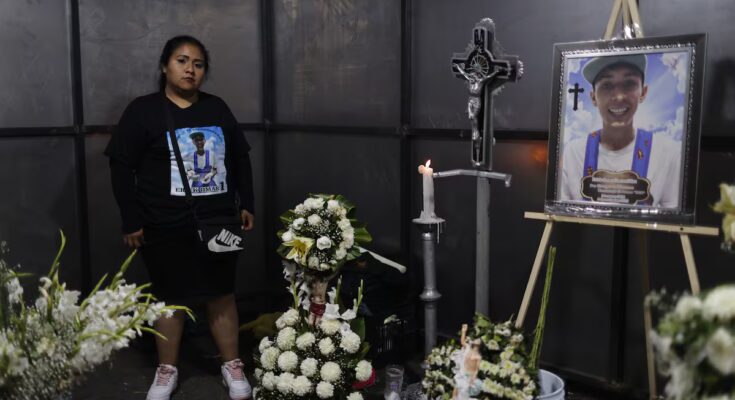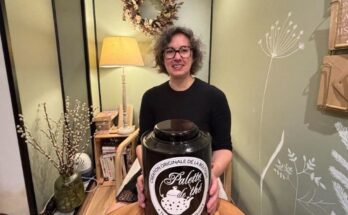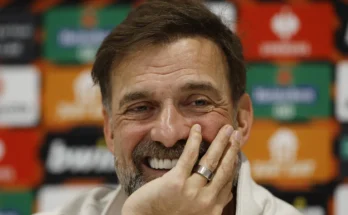Fresh flowers and lit candles surround the portrait of Erick Omar Chávez Díaz. In the midst of the hustle and bustle of the La Merced market, in the heart of the Mexican capital, a labyrinth of stalls selling products of all kinds lead to a small space, set up with chairs and tables to welcome the neighbours, family and friends of the young 21-year-old trader, who on the night of November 4th closed his stall in that same place and returned home, then went out to walk his dog Cabo. That night he was intercepted by at least five police officers from the capital’s City Security Secretariat (SSC). From the videos we now know that Chávez was arbitrarily arrested, beaten, dragged to the ground and found dead a couple of days later. On the third day of prayer for his death, his family denounces: “We still don’t know why they arrested him or why they killed him.”
Itzel Díaz Hernández, one of Chávez’s seven aunts, leads the family guard that welcomes participants. He gives instructions here and there and sits on a chair while others serve food and children play. Itzel, who is a trader like all her sisters, remembers each of the places she and her family visited on the afternoon and evening of November 5, when, very early on, Chávez’s partner told them he had not returned home. “He left here at 11pm, as usual. He didn’t do that thing of not showing up,” she says.
They went to various public prosecutor’s offices located in the area and searched the hospitals without finding him. They also requested information from the Mexico City Prosecutor’s Office (FJCDMX), where they repeated their denial. Later, when witness videos began to be shared online and appear in the media, the same agency informed the family that Chávez’s body was in their possession. “There is no one registered with that name or those characteristics,” they had been told earlier.
Furthermore, Díaz assures that they looked for the police chief in charge of the area to ask for his collaboration in the search for Chávez, when they still did not know what had happened to him and believed that he had disappeared. The same official was the one who contacted them a few hours later, after the first videos were released. “The head of the sector contacted us and summoned us to tell us that we had to file a complaint with the Interior Prosecutor’s Office because last night the police had made ‘a bet on the body’. I’m not sure what it was about,” he insists.
Although the family received Chávez’s body on the morning of November 7, it was only the previous afternoon that the head of the sector himself, responsible for the agents involved, informed of the young man’s death. “We didn’t see where the body was or where they found it. It was the police officers themselves who handed it over,” says Díaz. “We have already seen him inside, in the coffin. We just went to recognize him. We could see his body beaten, purple, green, his eyebrow open from a wound, even his nose and head. His hands were trampled on, as if they were crushed. His wrists seemed injured,” he describes.
The videos, proof of police violence
The young man’s family assures that thanks to the fact that a neighbor and two anonymous people sent them three videos from different perspectives of the beating, they were able to ensure that Chávez’s case did not fall into oblivion. Just last Tuesday, exactly one week after the events, the SSC reported that three of the police officers involved were arrested on Friday 7 November and linked to the proceedings on Monday. “Investigations continue to determine police action and determine responsibility,” capital police said in a fact sheet. The institution also announced the dismissal of the director responsible for supervising the agents. Although his aunt suspects that he has just been moved to another location. “Thank God those videos showed up,” he says.
In one of the materials shared from the night of the arrest – which lasted seven minutes – we see how the police, getting out of at least three patrol cars, load Chávez into one of them and we hear several dialogues between them: “He’s not the one who was there, right?”, and another replies: “No, this guy wasn’t there.” Later, as they held the young man inside one of the vehicles, one of them said to him, “You won’t pass out again, huh?” One of the officers also accuses him of having thrown something into the bushes and he is seen approaching to look for something. Without success.
Itzel Díaz reported that on the day they watched over his nephew, in the same place where his death is now prayed for, at least three police patrols arrived on the scene, presumably because they had asked for protection: “We didn’t ask for any help. They wanted to come in, who knows why, but we didn’t let them pass,” he recalls.
Chávez’s favorite pastime was playing football for his Real Merced team. She had started a small sweets business together with her partner, to support her family, which also includes her two children, aged 3 and 7. According to the family, the young man was happy, had many friends and wanted to have his own YouTube channel.
Despite their grief and sadness, his family, who have not yet been told the reason for Chávez’s initial detention, remains united and strong. They say they still have a lot to show, that there are videos that have not been released and that they hope this will help the police officers involved – all of them and not just the three already arrested – to be brought to justice. “We will not let this go unpunished. If they are released, we will close the streets, because it is not fair to us. We will not stop.”



